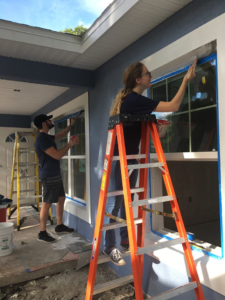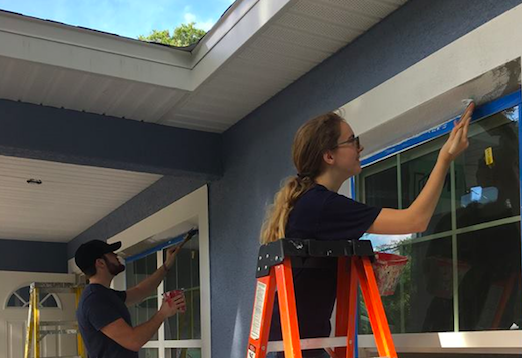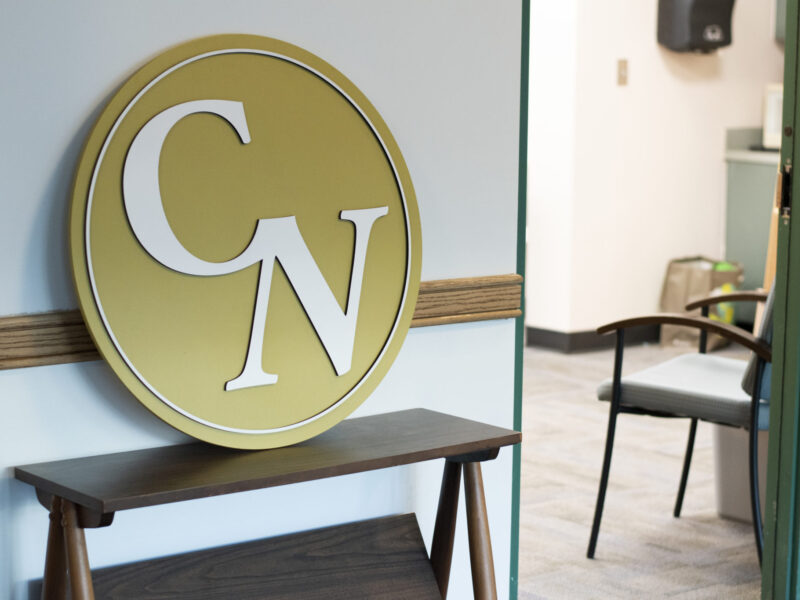By Emily Wunderlich
After two years of petitioning, USF St. Petersburg’s Alpha Phi Omega (APO) chapter will apply Sept. 25 to become nationally accredited.
It takes approximately six weeks for the application to be reviewed by the national board in Kansas City, and if approved, all new members will officially become brothers of the fraternity.
APO is the largest co-ed service fraternity in the world. Its core values are leadership, friendship, and service. Brothers of APO emphasize four levels of service: to the fraternity, to the school, to the community and to the world.
Vice President of Membership Alexius McZee says that the organization spent all summer attracting new members and increasing retention for APO.
“If APO successfully gets chartered, it would show that hard work, commitment, persistence and not giving up really pays off,” McZee said.
Some of APO’S most successful service projects around campus were building houses with Habitat for Humanity, serving food at the Salvation Army soup kitchen and making peanut butter and jelly sandwiches for the homeless.

Vice President of Fellowship Brianna Daviau reflected on the impact that service has had on her life since joining APO. “It’s brought me closer to people who love to volunteer and has made me more aware of all the different places in the area that need volunteers,” she said.
In order for a petitioning chapter to become nationally chartered, it must have at least 25 members to ensure that the Brotherhood survives for years to come. In addition, a petitioning chapter must meet specific requirements in the areas of service, fellowship, leadership and pledging.
During the pledging process, petitioning new members must undergo education regarding the history and lifestyle of the fraternity. Unfortunately, pledging also contributes to the stigma surrounding Greek life on college campuses.
Chapter President Amber Piazza makes it clear that her fraternity is nothing like the stereotypes portrayed in the media. The organization denounces any kind of reckless behavior that may put others in danger or tarnish the integrity of the fraternity, school or community.
“APO is much different than that,” Piazza said. “We’re very against hazing, [and] we’re very against any drinking.”
This will be the chapter’s third attempt at chartering. The school’s relatively small population has made it hard enough to attract new members, and lack of interest has kept membership involvement even lower.
Still, McZee remains optimistic that this time APO is ready to take the next step in becoming an established fraternity on campus.
“We attracted members with our service events and by going to university success courses [to] talk about APO and our mission,” McZee said. “We increased retention by creating a space where we could be a family and where people felt like they could express their ideas.”
While the number of fraternities and sororities on campus remains scarce, APO’s efforts could signal the beginning of a more prominent Greek life on campus.
Student Body President David Thompson contends that many students choose this campus because of its lack of Greek life. Those who are interested in starting their own organizations are faced with the challenge of limited housing space.
“However, new leaders in the Department of Student Life and Engagement have expressed interest in exploring this area in the coming year,” he said.
“In regards to APO, I think having one successful organization, coupled with support from administration, [will] definitely encourage people to create Greek organizations,” Thompson said.
If you are interested in joining APO’s founding class, meetings are held every Thursday at 7 p.m. in SLC 2101.



